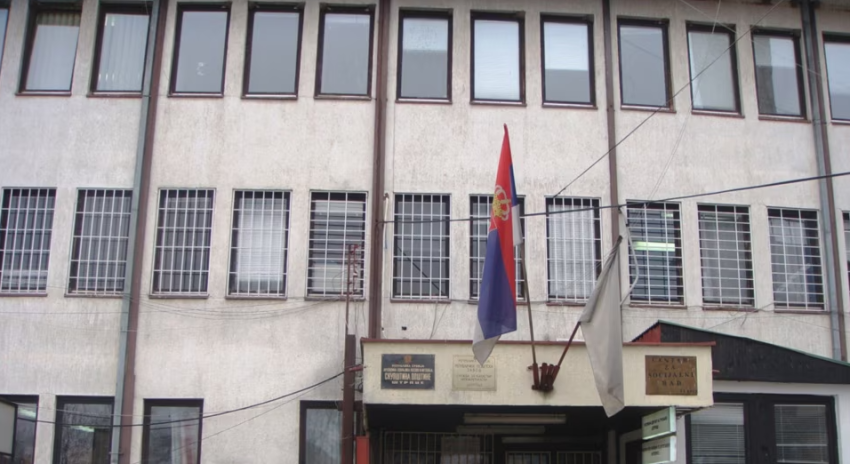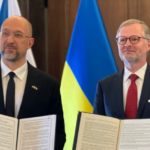Representatives of the civil sector in Kosovo, who monitor the rule of law, have different opinions on the interrogation of 14 workers from the parallel Serbian municipality in Štrpce, who worked there until two years ago.
This parallel municipality was closed during a Kosovo police operation in 2022 when security cameras believed to have been installed by Serbian local authority structures were confiscated. Later, the prosecutor’s office in Ferizaj seized computers and documents found in its premises.
Boban Petković, the lawyer of one of the interviewed workers, identified as Z.J., confirmed to Radio Free Europe that the workers from that municipality are now suspected of “undermining the constitutional order of Kosovo.”
The prosecutor’s office in Ferizaj told Radio Free Europe that it authorized the Serious Crimes Department to interview the suspected individuals.
Aleksandar Rapajić from the Non-Governmental Center for the Representation of Democratic Culture believes that Kosovo’s judicial institutions “interpret the law very broadly when it comes to the Serbian community,” including qualifying the criminal offense of “undermining the constitutional order of Kosovo.”
He warns that now, with the same charges, other employees in institutions funded by the Serbian budget could also be targeted.
Serbian President Aleksandar Vučić said on February 2 of this year that there are about 31,000 employees in Kosovo working in institutions operating under the Serbian system.
In the 2024 budget, the Government of Serbia allocated about 140 million euros for Kosovo, around 11 million euros more than last year. Serbia mainly provides these funds for salaries and the functioning of its institutions in Kosovo.
On the other hand, Ehat Miftaraj from the Kosovo Institute of Justice explained in a statement to Radio Free Europe that as a result of the Pristina-Belgrade Agreement, as part of the dialogue for normalizing relations, in 2015 the Kosovo Assembly adopted the Law on Amnesty to avoid prosecuting employees in Serbian institutions, instead integrating them into Kosovo’s institutions.
He recalls that Serbia was supposed to close its institutions in Kosovo, but this has not happened to this day.
“In this context, the state prosecutor has the authority and jurisdiction to initiate investigations against any individual performing public functions contrary to the constitutional and legal order of Kosovo,” says Miftaraj.
Kosovo does not recognize institutions operating under the Serbian system and considers them illegal. At the beginning of 2024, several parallel municipalities or “Temporary Municipal Authorities” in the Peja and Dragash regions were also closed, leading to international community reactions, claiming such decisions could increase tensions.
What is the burden on the employees of the parallel Serbian municipality in Štrpce?
Lawyer Boban Petković says that the criminal offense charged against the workers was not mentioned in the invitation for their interview, but he later learned this from the police.
“The only explanation they gave us, which in my opinion is not logical, is that my client and 13 other workers of the parallel municipality of Štrpce are accused of undermining the constitutional order because they worked according to the laws of the Republic of Serbia and thus operated against the laws of the Republic of Kosovo,” he told Radio Free Europe.
Petković adds that some of the questions in the session were: how many employees are there in the Temporary Municipal Authority of Štrpce, how many departments, what were their responsibilities, and whether they issued building permits, ID cards, and other documents.
Lawyer Petković believes that employees in Serbian institutions should not be accused of violating Kosovo’s constitutional order and says it is about “political pressure on the Serbian community.”
“People are very scared now, these individuals who were questioned are very afraid for their safety,” he emphasizes, adding that now all employees in Serbian institutions in Kosovo feel “threatened.”
“This is a test, if this passes, the next criminal charges will be against several tens of thousands of Serbs (working in Serbian institutions),” he added.
Reactions from Serbia
On July 15, the Office for Kosovo in the Government of Serbia announced that the sole purpose of interrogating workers in the Serbian system is to “break the spirit of the Serbian people” and “force them to leave their homes through additional pressure and intimidation.”
“Through this type of institutional violence, Albin Kurti wants to abolish Serbian institutions in Kosovo and erase the traces of Serbian existence in these areas,” the statement said.
It adds that the Office for Kosovo has informed the dialogue mediator, Miroslav Lajčak, and other relevant international missions about this case.
Are employees of Serbian institutions at risk?
For Rapajić, the interrogation of Štrpce municipality employees, who worked in the Serbian system, is “very dangerous” because most members of the Serbian community in Kosovo work in institutions funded by Serbia.
“The possibility opens up that every worker paid by Serbia could be accused of undermining Kosovo’s constitutional order. It is a significant blow to the Serbian community, which has survived all these years thanks to income from Serbia,” he says.
Members of the Serbian community in Kosovo, in addition to salaries, also receive other incomes from the Serbian budget, such as pensions, social assistance, maternity benefits, child allowances, etc.
Receiving these benefits has been challenging since the beginning of the year because the Central Bank of Kosovo decided that payments be made only in euros, not accepting those in dinars. This issue was a topic in the dialogue between Kosovo and Serbia, but the parties could not find a solution.
Currently, those receiving income in dinars can withdraw them only in Serbian cities or in euros in Kosovo with a commission.
Ehat Miftaraj from the Kosovo Institute of Justice does not exclude the possibility that hearings of Serbian institution employees could increase tensions and emphasizes that this is also why the international community insists that Pristina and Belgrade continue the dialogue.
“The reason why the EU and the international community are trying to make this dialogue successful in Brussels is to reduce tensions and create an atmosphere in which communities will come closer, which unfortunately is still not happening in Kosovo,” he says.
The dialogue between Kosovo and Serbia has been blocked since September last year when a group of armed Serbs attacked Kosovo Police in Banjska in the north, killing one of its members.
Kosovo Prime Minister Albin Kurti has set several conditions for continuing the dialogue, including the extradition of the former vice-president of the Serbian List, Milan Radoičić. Radoičić took responsibility for the attack and is believed to be in Serbia.







